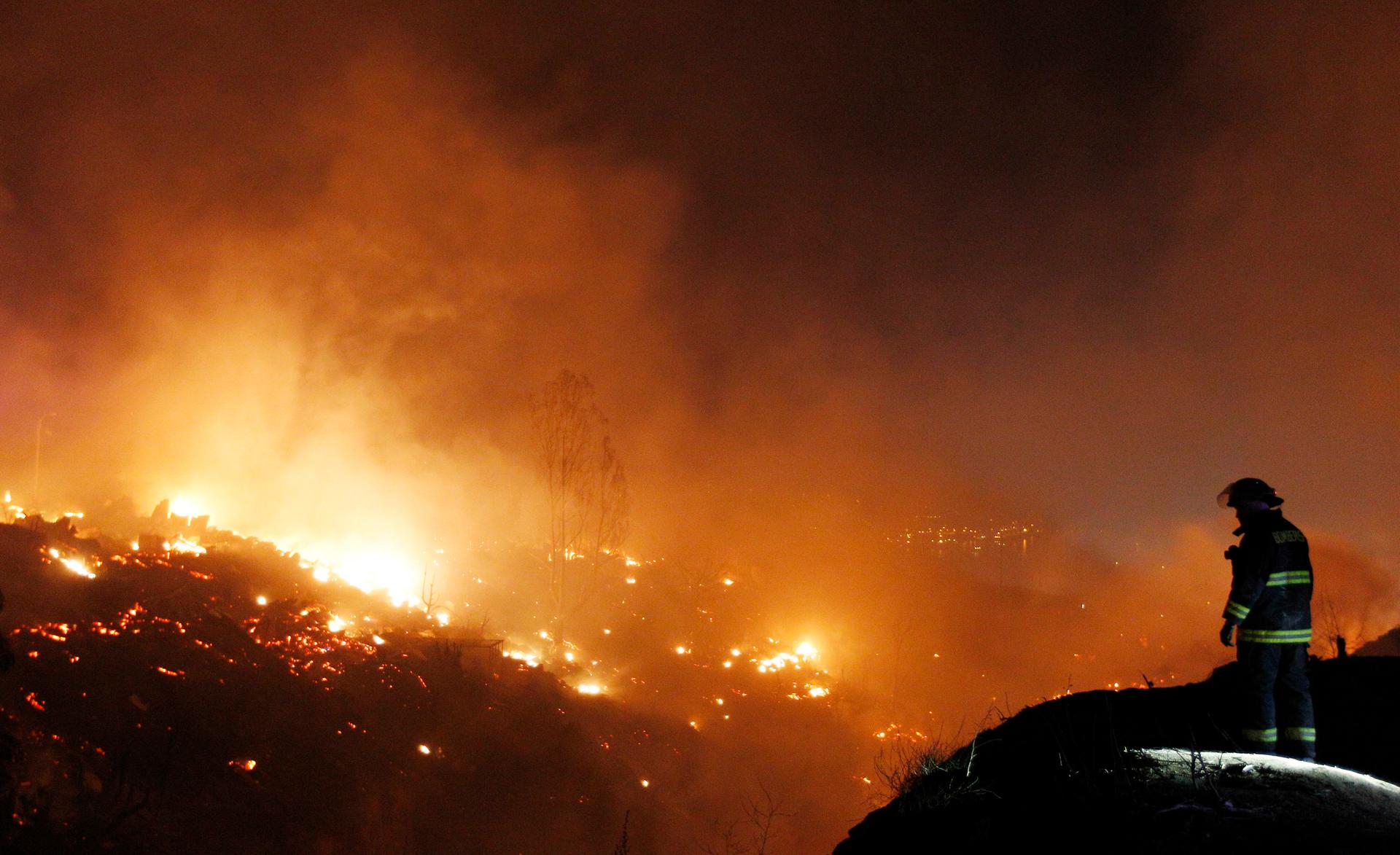A massive blaze leads Chile to reconsider its all-volunteer firefighting system
A firefighter works to put out a fire in Valparaiso city, northwest of Santiago.
The fire that engulfed the Chilean port city of Valparaiso in April took 15 lives, destroyed 3,000 homes and put a spotlight on the firefighters who battled the blaze, without compensation..
All 40,000 firefighters in Chile work completely unpaid, as volunteers. It's a tradition with deep roots.
"It really goes back to the foundation of the fire services here in the mid 19th century," said Gideon Long, a BBC reporter who is based in Santiago, Chile. "There was an awful fire in Santiago in 1863 and a bad fire in Valparaiso a few years earlier, and those two fires spurred the Chileans to set up their own fire services."
"But back in the 19th century," Long continued, "there was this altruistic notion that they should be serving the community for free. Now, in the light of this fire in Valparaiso, there's some debate to whether they should remain that way."
Though Chilean volunteer firefighters are professionally trained, there isn't any full-time, paid staff to coordinate activities and lead responses. Volunteer fire departments aren't uncommon in the United States, especially in rural areas, but often there's at least one or two paid employees in leadership roles.
"Because they're not paid, many of the firemen have to have day jobs, and they quite literally get a call in the middle of the day saying 'There's been a fire in Valparaiso,' or 'There's been a car accident on the motorway,' and they have to get permission from their employers to go out to put out the fire or to deal with the car accident," Long explained.
The companies employing the volunteers, from law firms to dental offices, don't get compensated for the time the firefighters are gone. "One of the arguments is that the state should at least compensate the companies to give them more of an incentive to let these guys go," he said.
If it were left to the firefighters, though, they wouldn't change a thing.
"I've been talking to a lot of them," Long said, "and they all say they do not want to be paid. They see it as an honor to serve the community for free. And there's also a more practical aspect to it as well. They say that they have no objection to people donating money to the fire service, but if they do donate money, that money should be used to update equipment, to buy new fire engines, or to invest in protective clothing, rather than paying salaries."
What do you think? Does your community have a volunteer fire department? Join the conversation by leaving your comments below.
The fire that engulfed the Chilean port city of Valparaiso in April took 15 lives, destroyed 3,000 homes and put a spotlight on the firefighters who battled the blaze, without compensation..
All 40,000 firefighters in Chile work completely unpaid, as volunteers. It's a tradition with deep roots.
"It really goes back to the foundation of the fire services here in the mid 19th century," said Gideon Long, a BBC reporter who is based in Santiago, Chile. "There was an awful fire in Santiago in 1863 and a bad fire in Valparaiso a few years earlier, and those two fires spurred the Chileans to set up their own fire services."
"But back in the 19th century," Long continued, "there was this altruistic notion that they should be serving the community for free. Now, in the light of this fire in Valparaiso, there's some debate to whether they should remain that way."
Though Chilean volunteer firefighters are professionally trained, there isn't any full-time, paid staff to coordinate activities and lead responses. Volunteer fire departments aren't uncommon in the United States, especially in rural areas, but often there's at least one or two paid employees in leadership roles.
"Because they're not paid, many of the firemen have to have day jobs, and they quite literally get a call in the middle of the day saying 'There's been a fire in Valparaiso,' or 'There's been a car accident on the motorway,' and they have to get permission from their employers to go out to put out the fire or to deal with the car accident," Long explained.
The companies employing the volunteers, from law firms to dental offices, don't get compensated for the time the firefighters are gone. "One of the arguments is that the state should at least compensate the companies to give them more of an incentive to let these guys go," he said.
If it were left to the firefighters, though, they wouldn't change a thing.
"I've been talking to a lot of them," Long said, "and they all say they do not want to be paid. They see it as an honor to serve the community for free. And there's also a more practical aspect to it as well. They say that they have no objection to people donating money to the fire service, but if they do donate money, that money should be used to update equipment, to buy new fire engines, or to invest in protective clothing, rather than paying salaries."
What do you think? Does your community have a volunteer fire department? Join the conversation by leaving your comments below.
